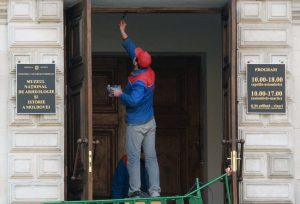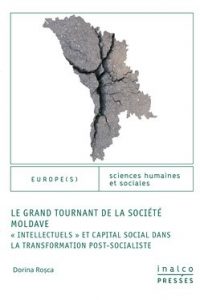 The author, a researcher at the EHESS, adopts a multidisciplinary approach from the outset, initially mixing economics and history but ultimately allowing economic sociology to take center stage. The book, published in 2019 by Inalco Press, is based on her doctoral thesis. It takes as its point of entry the social category known as ‘intellectuals,’ inherited from the Soviet world. It follows its transformations in Moldova from the early 1980s to the end of the 1990s.
The author, a researcher at the EHESS, adopts a multidisciplinary approach from the outset, initially mixing economics and history but ultimately allowing economic sociology to take center stage. The book, published in 2019 by Inalco Press, is based on her doctoral thesis. It takes as its point of entry the social category known as ‘intellectuals,’ inherited from the Soviet world. It follows its transformations in Moldova from the early 1980s to the end of the 1990s.
A multidisciplinary approach combining economics, history, and sociology
By Soviet doctrine, the definition of the social group of “intellectuals” was based on two precise criteria: “possession of a higher education diploma” and “employment in jobs characterized by non-manual work” (p. 16). In the Soviet Socialist Republic of Moldova, they represented around 450,000 people (out of a total population of 4 million) in 1985. Although heterogeneous and contrary to the cliché according to which the intellectual/working class ratio was reversed in the Soviet system compared to the criteria adopted in the West, this social category generally enjoyed a privileged status in Moldovan socialist society.
In the 1990s, after the disappearance of Soviet rules and norms, Moldovan ‘intellectuals’ were forced to adapt and reorientate their professional activities. Dorina Roşca highlights the many reconversion strategies adopted then and the diversity of the trajectories thus obtained.

A broader analysis of systemic change in Moldova
Looking beyond the intellectuals, the author proposes a broader analysis of social change in Moldova: “The group of ‘intellectuals’ within Moldovan society of the Soviet type constitutes a close representation of the socialist system itself” (p. 17). In other words, “the category of ‘intellectuals’ resembles a reduced model of the system” (Ibid.), which leads the author to postulate that “the analysis of its change can help to identify the particularities of the systemic change itself” (Ibid.).
Dorina Roşca draws on the perspective of ‘social capital,’ understood here in its Bourdieusian sense as ‘the set of actual or potential resources that are linked to the possession of a durable network of more or less institutionalized relationships and of inter-recognition and inter-recognition’ (p. 92). Because of the existence of a durable network of relationships, social capital is “a resource that is convertible into other types of capital (economic, cultural, symbolic)” (p. 18) and that has “a multiplier effect on the volume of overall capital possessed by an individual” (p. 89). As social capital differs from one individual to another, it effectively accounts for the individual strategies followed during systemic change. The initial inequalities in the distribution of this capital (even within the category of ‘intellectuals’) are logically mirrored in the post-socialist system.
Based on the results of two field surveys, D. Roşca shows that the new political and economic elites often (but not systematically) come from the old category of 'intellectuals.' However, fault lines have gradually emerged within this category, starting during perestroika: between urban ‘intellectuals’ (significant changes in professions) and rural ‘intellectuals’ (little change observed); between conservative urban ‘intellectuals’ and reformist urban ‘intellectuals;’ between political 'intellectuals' and technical-economic ‘intellectuals.’ The author concludes that “in this process of adjusting the trajectories (of all the actors identified), the legacy of social capital, particularly of the political type, from the traditional socialist system, was of manifest importance; it constituted an element of historical continuity between traditional socialism and reformist socialism” (p. 147).
A return to the original meaning of “intellectual.”
The author draws on various sources: official statistics, Moldovan and foreign academic sources (Russian, Romanian, and others), the press, and international social science literature. She also draws on two surveys for this research, which provide personal and concrete illustrations.
These include the importance given to the rural/urban divide, the dualisms of the private/public and market/non-market sectors, developments in relations with Romania and Russia, and the distinction between standardized, relational, and political social capital.
The historical perspective dominates the whole, linking the long, medium (of the order of a decade) and short (particularly for the few critical years before and after the end of the Soviet Union in December 1991) timeframes.
Dorina Roşca’s book has the great merit of showing that the category of ‘intellectual’ here is a socio-political construct inherited from the socialist system, but also that this category experienced an initial fracture of its institutional unity with perestroika and a second after the collapse of the USSR. As a result of these many changes and transformations, the notion of ‘intellectual’ is now closer to ‘its original sociological meaning of transmitter and producer of knowledge (...): teachers, professors/researchers, artists, writers, etc.’ (p. 275).
Thumbnail: Céline Bayou.
Dorina Roşca, Le grand tournant de la société moldave. « Intellectuels » et capital social dans la transformation post-socialiste, Presses de l'Inalco, Paris, February 2019, 337 p.
* Assen SLIM is an assistant professor at Inalco and a professor at ESSCA.
